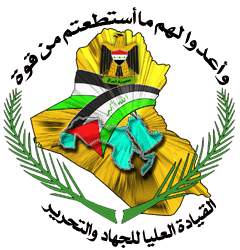This article has multiple issues. Please help improve it or discuss these issues on the talk page . (Learn how and when to remove these messages) |
| Supreme Command for Jihad and Liberation | |
|---|---|
| القيادة العليا للجهاد والتحرير | |
 | |
| Leaders | Izzat Ibrahim al-Douri |
| Dates of operation | 3 October 2007 – 18 December 2011 |
| Country | |
| Allegiance | |
| Motives | Re-establishment of Ba'athist Iraq |
| Active regions | Iraq, Sunni Triangle |
| Ideology | Ba'athism Saddamism Iraqi nationalism Arab nationalism Arab-Islamic nationalism Sunni Islamism |
| Size | 1,000+ |
| Allies | |
| Opponents |
|
| Wars | the Iraq War |
| Flag |  |
The Supreme Command for Jihad and Liberation (a.k.a. Supreme Council of Jihad and Liberation or SCJL or Ba'athist Loyalists) was an Iraqi front comprising some 23 militia groups formed in 3 October 2007 and were led by former Iraqi vice president and deputy chairman of the Revolutionary Command Council Izzat Ibrahim al-Douri. The name is also often used to refer to the largest militia in the front, the Army of the Men of the Naqshbandi Order (also known by its Arabic initials JRTN), which was commanded by Douri himself. [1]
Contents
The formation of the coalition was announced on 3 October 2007 in a videotaped message broadcast on the Arab satellite television channel Al Arabiya and in a statement posted on a Ba'athist website. [2]